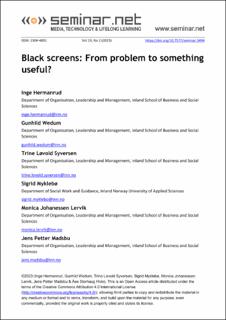Black Screens From problem to something useful?
Hermanrud, Inge; Wedum, Gunhild; Syversen, Trine Lovold; Myklebø, Sigrid; Lervik, Monica Johannesen; Madsbu, Jens Petter; Hole, Åse Storhaug
Peer reviewed, Journal article
Published version
Permanent lenke
https://hdl.handle.net/11250/3125300Utgivelsesdato
2023Metadata
Vis full innførselSamlinger
Originalversjon
10.7577/seminar.5494Sammendrag
In this article, we ask the question: Why do students choose to turn their cameras off during online teaching? We discuss this issue from the perspective of adaptive structuration theory and media richness theory. We use qualitative data from 169 free text answers from two surveys conducted during the pandemic: in May/June 2020 and May/June 2021. In our analysis, we have developed three categories – “the social context”, “window mirror” and the “noisy classroom” – to better understand why students turn off their cameras. Based on these categories, we describe problems that turning off the camera is a response to. These problems are: too many cues, attributes of the home that might promote negative feelings, disclosure of home and personal activities, and online self-image. Our findings are in line with other research that contends that turning off the camera helps to reduce problems, such as an invasion of privacy that could be distracting and uncomfortable, and “digital fatigue”. We contribute to the research field by describing that some students turn off their camera for another reason: to maintain their self-image. However, although turning off cameras solves problems, the resulting “black screens” create new problems, in the form of less engagement for collaborative learning activities and an increased feeling of isolation among students.

